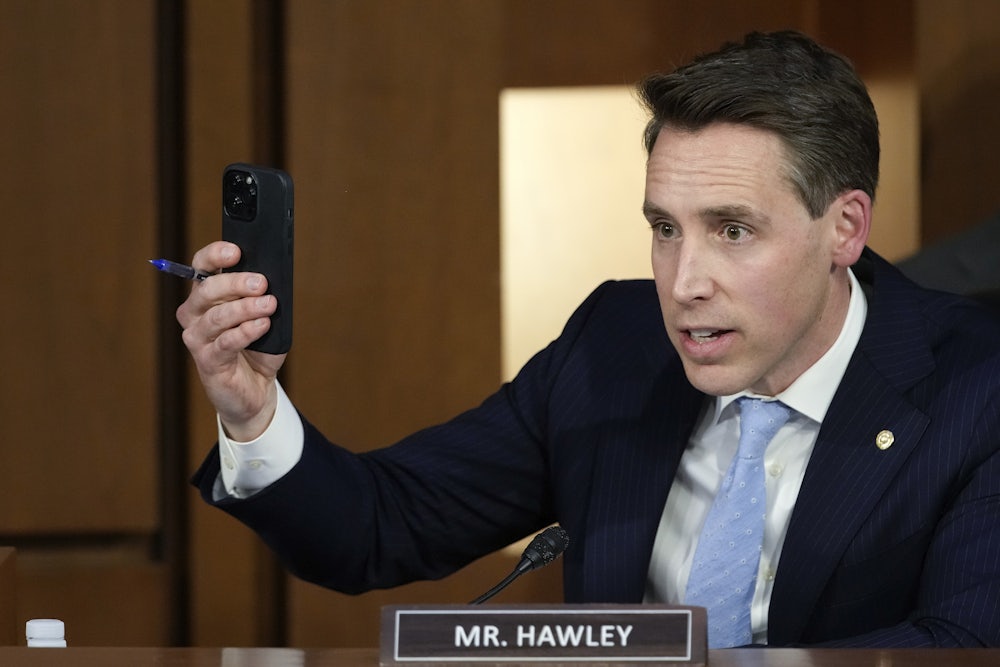Traditionally, confirmation hearings for Supreme Court nominees aren’t all that interesting. In recent years, they’ve followed a rather dull script: Senators aligned with the president promote the nominee; those arrayed against him pepper his pick with hot-button hypotheticals—which the nominee, in turn, usually parries with a nonanswer that’s suitably charming. But the most recent hearings for Ketanji Brown Jackson featured a notable uninvited guest: QAnon, the baroque conspiracy-mongering movement that slouched forth from the depths of the internet during the Trump era. A central tenet of the movement is the idea that powerful American elites are all involved in a massive child trafficking ring.
In particular, Missouri Senator Josh Hawley was bent on making hay out of the sentences handed down by Jackson in child pornography cases, which he insinuated were suspiciously weak. The QAnon connection in this line of inquiry did not go unnoticed by observers. Its adherents took heed: NPR reported that a “steady drumbeat of amplification” followed hard on the heels of Hawley’s pandering, on various internet platforms popular with the far right.
These “dog whistles” were so obvious and abundant that it was surprising to hear one witness to the hearings, Delaware Senator Chris Coons, claim he didn’t notice them at all. Asked by a reporter if he was concerned about “Republicans playing to the QAnon base,” Coons responded, “I wouldn’t understand what an appeal to the QAnon base looks like. So if that’s what’s going on, I’m missing it. Because frankly, that’s not a frame that resonates with me.”
Hopefully, Coons is just being snarky and insincere, because the alternative is that he’s been essentially sleepwalking through the grim, QAnon-soaked politics of the last few months. There’s Ginni Thomas, a conservative activist and wife of Supreme Court Justice Clarence Thomas, sending QAnon-inflected texts to former Trump chief of staff Mark Meadows. In Florida, the recently passed “Don’t Say Gay” bill has been direct-marketed to Q consumers as a vital law against the “grooming” of children. Even Madison Cawthorn’s bizarre claims of having been invited to drug-fueled orgies in Washington take a page from the Q playbook. Like it or not, this is a frame that’s resonating very loudly.
The truth is, QAnon is just a new digital patch for an old way of doing conservative politics, something that TNR’s Melissa Gira Grant and, more recently, Jezebel’s Kylie Cheung have done a great job teasing out. Grant has long argued that QAnon is only a “slightly moderated form of the child sex trafficking paranoia” that has long been “utterly mainstream.” Cheung notes that the “rise of cultural lore about supposed pedophilia and child sexual abuse at daycare centers in the 1980s was deployed as part of anti-feminist backlash against mothers for supposedly endangering their kids by dropping them off at daycare to go to work.” TNR contributor Talia Lavin goes even further, placing the roots of the QAnon style of American politics all the way back in the twelfth century.
Naturally, what matters more than contending with the historical roots of this constantly updating Fake Panic Engine is confronting its aims in the here and now. As Vanity Fair’s Jeff Sharlet—himself no newcomer to the phantasmal strains of right-wing ideology—notes, those who would dismiss the flamboyant QAnon pandering of Josh Hawley and others are missing their underlying goals: “Such performances function to build rightwing power by expanding its realm of aggression,” he wrote on Twitter. Let’s recall that in the aforementioned confirmation hearings, Republican senators also offered barely veiled signals that they want to undo broad swaths of the status quo, from marriage equality to legal contraception.
It’s not necessary to sincerely believe in the violent “day of the rope” fantasia that forms the backbone of the QAnon mythos, or even cite QAnon by name, to harness the movement for right-wing base-building power. As Grant explained, “Q may not be a ‘political’ movement, but it is a movement useful to politicians. It doesn’t need a coherent politics for that; its base is there for the taking, if a candidate can graft their campaign to its story.” TNR’s Osita Nwanevu concurred, noting that anyone with either “a material or ideological interest in keeping the Democratic Party and its voters from power by any means possible” can and will put “conspiracy theories” to use in the service of making its members look bad in “hope of their eventual comeuppance.”
Perhaps most critically, Nwanevu urged his readers not to make the “fatal” mistake of dismissing QAnon, or those utilizing it for far-reaching ideological ends, as a fringe concern among yokels or red-blooded far-right ideologues. QAnon was, at the time of his writing last year, very much a white-collar concern. It is primarily well-educated professionals who have employed QAnon as a vector for manufactured panic in the service of political goals.
It’s then not a surprise that Big Tech, working in concert with the right-wing knowledge sector, is taking a page from the same book to serve its own ends. Just this week, The Washington Post’s Taylor Lorenz and Drew Harwell reported that Facebook (itself a seething conduit of misinformation about the 2020 election) has been working with a Republican consulting firm called Targeted Victory to destroy TikTok by inventing fake controversies in order to “boost” the very QAnon-esque message that TikTok is “a threat to American children.” Take a look at the young, fresh faces of the Targeted Victory team of well-heeled professionals for yourselves. This is what an appeal to the QAnon base looks like. We ignore it at our peril.










